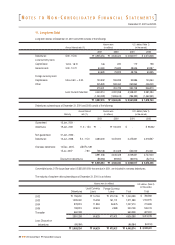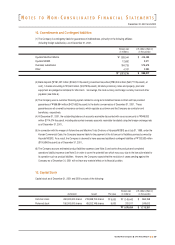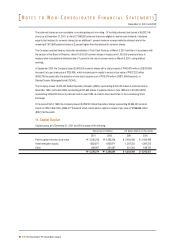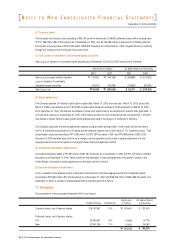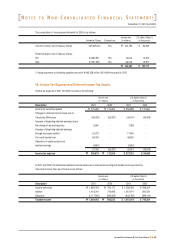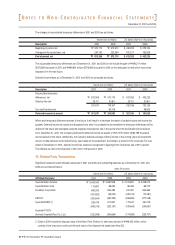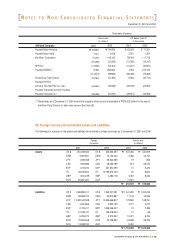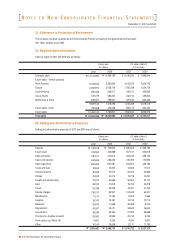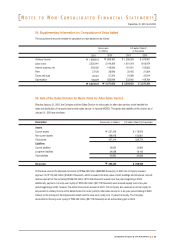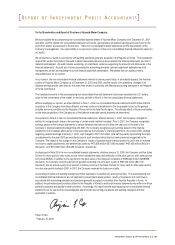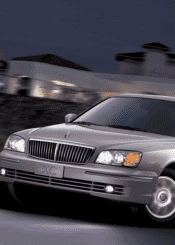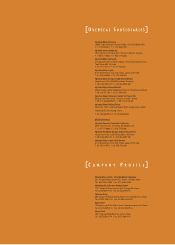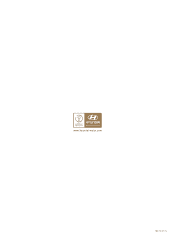Hyundai 2001 Annual Report Download - page 66
Download and view the complete annual report
Please find page 66 of the 2001 Hyundai annual report below. You can navigate through the pages in the report by either clicking on the pages listed below, or by using the keyword search tool below to find specific information within the annual report.
To the Shareholders and Board of Directors of Hyundai Motor Company:
We have audited the accompanying non-consolidated balance sheets of Hyundai Motor Company as of December 31, 2001
and 2000, and the related non-consolidated statements of income, appropriations of retained earnings and cash flows for the
years then ended, all expressed in Korean won. These non-consolidated financial statements are the responsibility of the
Company's management. Our responsibility is to express an opinion on these non-consolidated financial statements based on
our audits.
We conducted our audits in accordance with auditing standards generally accepted in the Republic of Korea. Those standards
require that we plan and perform the audit to obtain reasonable assurance about whether the financial statements are free of
material misstatement. An audit includes examining, on a test basis, evidence supporting the amounts and disclosures in the
financial statements. An audit also includes assessing the accounting principles used and significant estimates made by
management, as well as evaluating the overall financial statement presentation. We believe that our audits provide a
reasonable basis for our opinion.
In our opinion, the non-consolidated financial statements referred to above present fairly, in all material respects, the financial
position of Hyundai Motor Company as of December 31, 2001 and 2000, and the results of its operations, changes in its
retained earnings and its cash flows for the years then ended in conformity with financial accounting standards in the Republic
of Korea (see Note 2).
The translated amounts in the accompanying non-consolidated financial statements have been translated into U.S. dollars,
solely for the convenience of the reader, on the basis set forth in Note 2 to the non-consolidated financial statements.
Without qualifying our opinion, we draw attention to Note 1 of the non-consolidated financial statements which states that the
operations of the Company have been affected, and may continue to be affected for the foreseeable future, by the general
unstable economic conditions in the Republic of Korea and in the Asia Pacific region. The ultimate effect of these uncertainties
on the financial position of the Company as of the balance sheet date cannot presently be determined.
As explained in Note 2 to the non-consolidated financial statements, effective January 1, 2001, the Company changed its
method for recognizing its share of the earnings of certain equity method investees. Prior to 2001, the Company recognized
earnings based on the financial statements of certain investees that were as of a date one year prior to the date of the
Company’s financial statements. Beginning with 2001, the Company recognizes such earnings based on the financial
statements of all investees which are as of the same date as the Company’s financial statements. As a result of this change,
beginning retained earnings at January 1, 2001, was charged to "21,704 million ($16,367 thousand) representing the catch-
up adjustment for the year 2000 accumulated losses of such investees which had not been previously recognized by the
Company. The impact of this change on the Company’s results of operations and financial position for 2001 was to increase
net income, capital adjustments, and deferred tax assets by "75,595 million ($57,006 thousand), "57,439 million ($43,314
thousand), and "21,606 million ($16,293 thousand), respectively.
As discussed in Note 25 to the non-consolidated financial statements, effective January 31, 2000, the Company sold the Sales
Division for motor parts for after-sales service, which handled the sales and distribution of the parts used for after-sales service,
to Hyundai MOBIS. In addition to the payment for the book value of the disposed net assets of "396,422 million ($298,938
thousand), the Company receives payment for goodwill consisting of a lump-sum royalty of "50,000 million ($37,705
thousand), and an annual royalty of ten percent of ordinary income of the Sales Division for motor parts for after-sales service
for a ten year period starting in 2000. In 2001, the Company received the lump-sum royalty.
Accounting principles and auditing standards and their application in practice vary among countries. The accompanying non-
consolidated financial statements are not intended to present the financial position, results of operations and cash flows in
accordance with accounting principles and practices generally accepted in countries other than the Republic of Korea. In
addition, the procedures and practices utilized in the Republic of Korea to audit such financial statements may differ from those
generally accepted and applied in other countries. Accordingly, this report and the accompanying non-consolidated financial
statements are for use by those knowledgeable about Korean accounting procedures and auditing standards and their
application in practice.
Seoul, Korea,
February 15, 2002
R
EPORT OF
I
NDEPENDENT
P
UBLIC
A
CCOUNTANTS
69
2001 Annual ReportHyundai Motor Company


